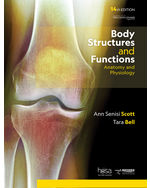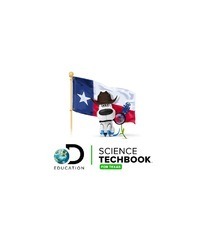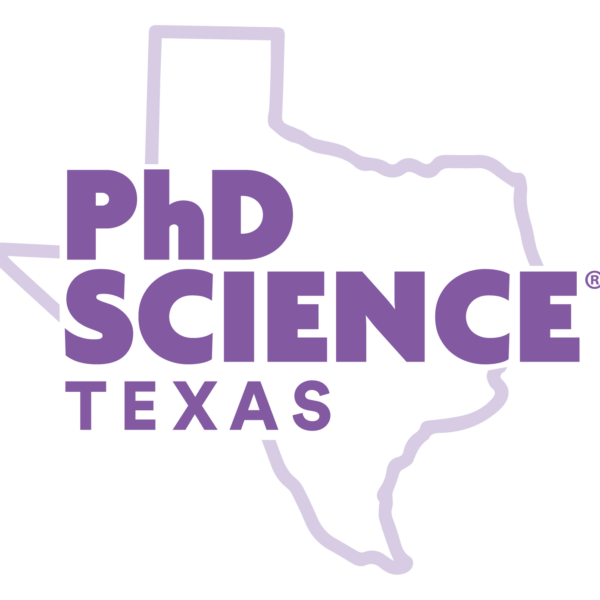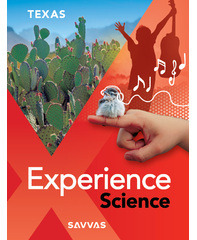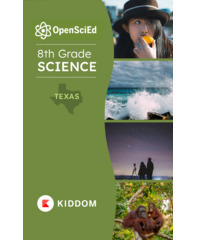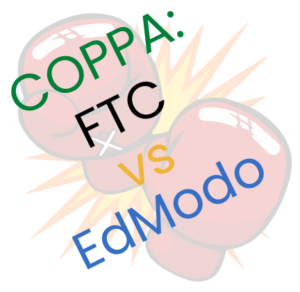National Geographic/Cengage’s Body Structures and Functions (National Geographic Anatomy) is a comprehensive science program for high school Anatomy and Physiology. The program focuses on introducing students to the organization, structures, and functions of the body to help them understand how body systems work. The materials are available in print and digital format. Digital components are accessible to students and teachers from National Geographic Learning/Cengage’s interactive MindTap platform.
Jackie Lain
New Curriculum Reviews: Discovery’s Science Techbooks (K-8)
Discovery Education’s Science Techbook for Texas (Discovery Texas) is a comprehensive science curriculum for grades K-8. The material focuses on helping students act as scientists and engineers through relevant phenomena, hands-on labs, and interactive activities. The materials are available in print and digital formats. Discovery Texas organizes learning around phenomena and recurring themes and concepts present in the Texas Essential …
New Science Curriculum Reviews: PhD Science K-5
Great Minds’ PhD Science Texas (PhD Science Texas) is a comprehensive science curriculum for grades K-5. The material focuses on students making sense of and explaining scientific phenomena. The goal of the program is for students to “engage in learning that builds their coherent understanding of scientific knowledge.” As of September 2023, the materials are available in print only.
PhD Science Texas organizes learning in three modules per grade level, based on topics typically addressed in elementary science. Each module includes multiple lessons which are grouped based on related concepts. Lessons are intended for 35 minutes of instruction in grades K-2 and 45 minutes of instruction in grades 3-5.
New Science Curriculum Reviews: Savvas Texas Experience Science
Savvas’ Texas Experience Science is a comprehensive science curriculum for grades K-8, which focuses on bringing science concepts to life through collaborative, hands-on activities. The material is available in English and in Spanish and in print and digital formats.
Experience Science organizes learning around seven topics in each grade level. Each topic includes a launch, which introduces the topic, an anchoring phenomenon, and multiple “Experiences” (lessons). Experiences are based on the 5E model and span three, four, or five days of instruction, depending on the lesson model teachers select.
New Science Curriculum Review: HMH Into Science Texas K-8
Looking for an activity-based science curriculum? Don’t miss our reviews of HMH’s Into Science.
Houghton-Mifflin Harcourt’s Into Science (Into Science) is a comprehensive science program for grades K-8. The program focuses on providing student-centered activities intended to “bring out every student’s inner scientist.” Learning List has reviewed the version of the material submitted for state adoption under Texas Proclamation 2024. While the Texas version includes content specifically aligned to the Texas Essential Knowledge and Skills (TEKS), the material’s format and features are likely the same as in the national version. Thus, the information contained in this review would be useful to districts in every state.
The materials are available in print and in digital format. The digital version of the material is provided on HMH’s Ed platform.
New Curriculum Review: Kiddom’s OpenSciEd
As the materials adoption season begins, curriculum reviews can save you hours of work. If you are looking at science materials, learn about a science curriculum we have reviewed for middle school.
OpenSciEd Science powered by Kiddom is a comprehensive science program for grades 6-8 and high school Biology. This review is based on the version of the material submitted for state adoption under Texas Proclamation 2024. While the publisher may have developed some content in this version specifically to align to the Texas Essential Knowledge and Skills, the material’s format and features are likely the same as in the national version of the material. Thus, the information contained in this review would be useful to districts in every state.
COPPA Compliance: Learn from Edmodo’s Experience
On May 22, 2023, the Federal Trade Commission (FTC) issued a proposed settlement order in a first-of-its-kind case against an education technology (ed tech) company for violating the Children’s Online Privacy Protection Act (COPPA) Rule. The settlement order contains valuable guidance for ed tech companies and school districts that work with them. Congress enacted COPPA in 1998 with the goal …
Got K-12 Curriculum Chaos? Don’t Despair -Just Audit!
The end of the school year and the impending ESSER cliff are two forces compelling districts to review their K-12 curriculum materials to determine which instructional resources to keep and which to discard. If you are involved in making those decisions in your district, the first question you are likely asking is, “Which materials are teachers using?” Several companies, including …
A Radical Rewrite of Texas’ Instructional Materials Laws Threatens to Dismantle the K-12 Market
If you care about instructional materials, you need to know about legislation that is sailing through the Texas legislature: House Bill 1605 (Buckley) and its identical companion Senate Bill 2565 (Creighton). The legislation would implement significant changes in how instructional materials are selected and used in Texas classrooms. Why should you care? California, Texas, New York, and Florida have long been …
The Great Debate: Print vs Digital K-12 Materials
A recent EdWeek article titled, Why Printed Books Are Better Than Screens for Learning to Read addresses the debate over print vs digital materials for young learners in an interview with Maryann Wolf, the director of the Center for Dyslexia, Diverse Learners, and Social Justice at UCLA Graduate School of Education and Information Studies.
Wolf begins by saying that the answer is not binary. “There are advantages and disadvantages for each type of medium [e.g., paper books, audiobooks, computers, e-readers, and phones], depending on the purpose or intention.”
